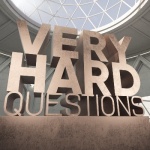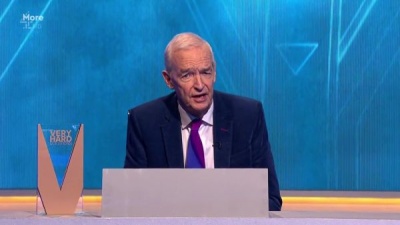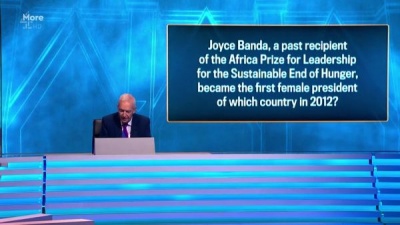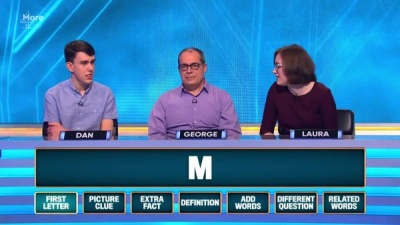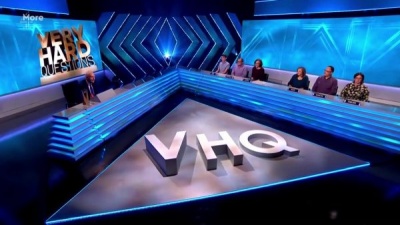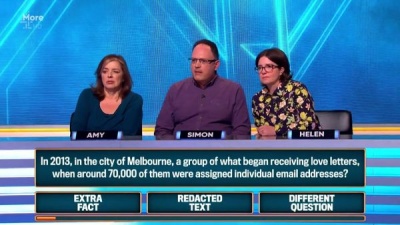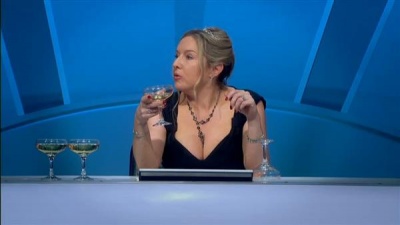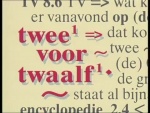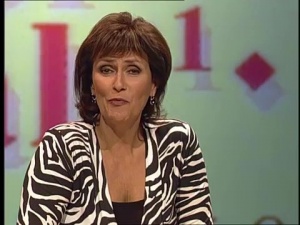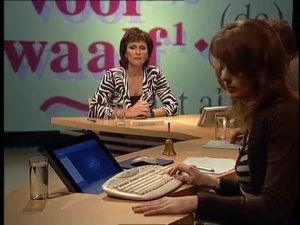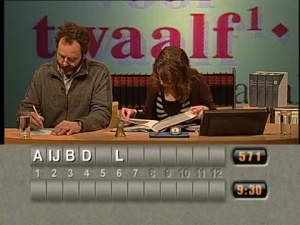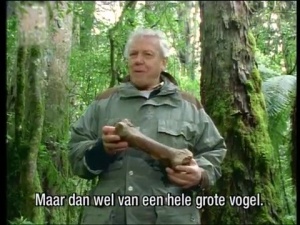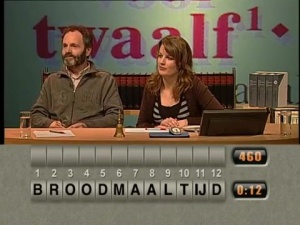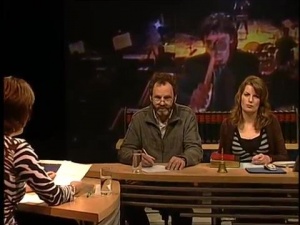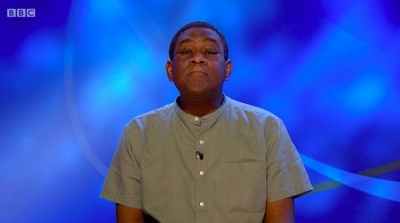Weaver's Week 2020-03-15
Last week | Weaver's Week Index | Next week
Hello, viewers. We're going to tell you a bedtime story. Are you sitting comfortably? Then we'll begin.
Contents |
Jon Snow's Very Hard Questions
Youngest Media for More4, from 17 February
Once upon a time, not so long ago, Jon Snow went to the Village of the Morvor. He had been summoned by Intelligencia, the Morally Ambiguous Witch who was in charge over the Village. Intelligencia wanted to find the Cleverest of the Clever, the Smartest of the Smart, the Eruditest of the Erudite.
To find Intelligencia's champions, Jon organised a tournament between the various contenders. He would ask some Very Hard Questions, and score the answers that each team gave. "What colour is a mirror?" is one question. "Why is it that rain drops but snow falls?" "What do you mean by 'Eruditest'?"
These semantic conundra made for great debate, but proved remarkably difficult to score. To make his life easier, Jon Snow asked questions to which there was one, clear, unambiguous answer.
The teams would be allowed to consult ten Oracles of the Clue, mystical creatures who while away the tedium of eternal life by playfully teasing mortals. Each would grant a small insight upon the solution. Across the course of the event, these "clues" are: First letter, Picture clue, Extra fact, Definition, Add words, Different question, Related words, Multiple choice, Audio clue, Redacted text.
Each Oracle spoke plainly, for they wished to tease by response: they did not waste energy on their own name. All of their titles are self-explanatory, but Jon Snow never hesitates to explain the obvious.
Each tournament began with one group of questors being asked four questions. If they could give an answer, after conferring amongst themselves, they could offer it. If they could not, the team may seek counsel from one of the Oracles of the Clue.
But each Oracle could only be consulted once in each round: these are busy Oracles, and they do not wish to be distracted too often. Gaffs Under the Gavel won't watch itself, you know.
Remote viewing was enabled, so that Intelligencia and all in Morvor could review progress. Basic captions were provided, showing the current question or the most recent clue. The captions were so basic that the question might not be shown, and it was surprisingly difficult to work out the score.
After the questors were sure of their answer, they would give it to Jon Snow. If correct, they would score four points, less one point for each Oracle of the Clue consulted. If incorrect, no score would be awarded.
A second team of questors were then asked a different question on a completely unrelated topic. Play passed back and forth between the sides, interrupted only by a commercial announcement.
After almost half-an-hour, a second round of questioning began. The teams saw three of Jon Snow's Very Hard Questions at once, and were permitted to consult five of the Oracles during the round. Jon would still award points for correct answers, but an incorrect response on any question would score nothing for this round. The team was permitted to pass on any question they were unsure about.
While Intelligencia was interested by the teams' progress, and mildly amused by some of the discussion, the court in Morvor grew restless. "This is a very slow tournament," grumbled one. "Tedious," declaimed another. "Sponsored by Northern Trains," said a third.
The final round was Very Hard Questions Against The Clock. Each team would see a question, and be allowed to consult three of the Oracles. They also faced the Creeping Clepsydre of Crumption: should they not provide an answer within one minute, the Very Hard Question Against The Clock would self-destruct, and the team could score no points from it.
Each team saw five of these Very Hard Questions Against The Clock, before the contest concluded with The Very Hardest Question Of All. It is the only time that both teams went brain-to-brain in combat: all other questions were assigned to one team or the other, and would not be passed over even when wrong.
Each individual questor could buzz in and stop Jon from consulting more Oracles of the Clue; should the questor give a false answer, they and their entire team would be ignored for the rest of the question. Jon offered eight points for this question, diminishing by one for each Oracle consulted.
After all of the heats were complete, Intelligencia had two candidate champions, and repeated the process between them to determine an overall winner. They were rewarded with a prize like no other, and riches beyond compare (well, £5000 and a trophy between them).
Now, Intelligencia had a rival on the other side of the Beebee Sea. Brainella presided over a similar tournament, seeking to find the most clever, most smart, most erudite team of champions, and never a cross word. The tasks there were simple to explain: What connects these things? What's next in the sequence? Build me a wall, and find me some vowels.
Brainella's tournament was snappier: each question was under a strict and harsh time limit. It was fun, with room to explain and discuss and even to joke about what the questions were about. And almost all of the questions in the "Only Connect!" were interesting in their own right.
By comparison, Jon Snow tended to ramble. He would let the teams discuss interminably amongst themselves, only gently chivvying them along. And when it came to reading out the additional fact, the host is able to read out something from a script in front of him. Jon Snow knows nothing of improvisation, of humour and levity and adding value to the show. His questions were dull, and the show was as entertaining as its questions.
The questions he asked tended to be dull, the interest often lay in the contributions from the Oracles, but so often the Oracle with something interesting to say wasn't asked. Long-established "Round the Island Quiz", currently chaired by that very nice Tom Sutcliffe, raises the standard for very hard, very approachable, and very interesting questions. Jon Snow asked very hard questions.
Or so he thought. Were these questions really so hard? The supercool funksters at the Illin' House of Games thought not, they would ask many of the same questions – shorn of the overwrought flummery – for their light-hearted teatime entertainment.
It is possible – but very hard – to make a rival to Brainella's "Only Connect!". We have not yet seen its like. Tell it to the bees: their hive minds produced a honey-glazed entertainment that never quite caught the people's imagination, and left only a banging piano riff.
Now, has our bedtime story worked? Are you fast asleep? Good. *That* is the abiding legacy of Jon Snow's Very Hard Questionzzzzzz.
Twee voor Twaalf
BNNVARA on NPO2
While it's not axiomatically true that the Dutch do everything better, it is often the case. Twee voor Twaalf is a perfect example of how to do a highbrow quiz in an entertaining way.
The show title translates as "Two for twelve": two contestants work together to solve twelve questions. The questions are quite long, giving lots of information about the subject before getting to the subject. Almost every question is accompanied by a film clip, and there's often some tinkling music playing. For instance,
"Found in many deluxe cars, it is an apparatus invented so that cars can run more efficiently. The driver can push the gaspedal of the motor down to run at a constant speed. What is the English name of this invention?"
When read by Astrid Joosten at a leisurely pace, in Dutch, and including some information that we can't translate, this question takes about 30 seconds to read. If the team know the answer is "cruise control" straight away, then brilliant. Write it down, move on.
Otherwise one of the team will research the answer from a range of reference works – a printed encyclopaedia, dictionaries, specialist books on art and literature and biography, and more contemporary references. The team also has access to a laptop on which they can view a selection of pages downloaded from the internet.
These books don't come for free. Every time a player reaches for the books, or looks something up on the laptop, a clock starts ticking. They're docked a point every two seconds; rarely will both players be using the reference material, and the team is docked a point every single second. To stop the drain, the player needs to ring a bell and give their answer promptly.
Promptly, but without interrupting Astrid the moderator, who is already reading the next question. Generally, one player will look things up in the books, while the other listens to the questions. The players don't get the written text of the questions, like they do on Radio 4's Round the Island Quiz.
As we mentioned, almost every question comes with some stock film, or a specially produced animation from the students at HKU. These help to add some visual entertainment to the show, it's not just text flying across the screen. The show has a certain pace – the 12 questions will be dealt with in about ten minutes – so if this question bores you, there's literally another one along in a minute.
The questions tend to the highbrow – sculpture, literature, politics and philosophy – but will cover some lowbrow subjects. Our sample episode featured a clip of a naturalist holding the bone from a big bird.
The first letter of each answer goes into a rack of letters on screen. We viewers get some hints – we see which answers are right and which are wrong, a help not available to the players. And we can see both teams play – they'll often give questions on a similar topic, both teams might be asked about Formula One pilots.
The show's finale is to assemble the letters into a twelve-letter word, of which there are plenty in Dutch. The team can begin this task when they're ready, and must start it with two minutes to go. They can "buy a letter" – move it into the word in the correct place, at the cost of 10 points. If they try to buy an incorrect answer – the "B" of David Bellamy, for instance – it'll be replaced by a question mark. Can the team complete the word before time runs out?
If they do, they'll be rewarded. The show's score started at 500 points, drops during the research periods, and for buying letters in place. They'll get bonus points for each second remaining when they do solve the word, and a 25 point bonus for each correct answer beyond the eighth – so 100 points for naming all 12 answers. Two teams play on each edition, and the winning team gets their score converted into euro.
Any long-running show will attract parodies and catchphrases, Twee voor Twaalf is no exception. The phrase "Dat zoken ik op" – I'll look that up – has passed into general speech, like English has adopted "Phone a friend" and "Route one football". Twee voor Twaalf is a quiet show, a very similar atmosphere to Only Connect – it's both studious and able to have a little bit of fun.
And it's vastly more interesting than Very Hard Questions. Why didn't More 4 commission the proven format? That might be the hardest question of them all.
Dave Rainford
We heard last Saturday that Dave "Tremendous Knowledge" Rainford from Eggheads had died. We've heard nothing but warm tributes in the week since.
His Eggheads co-star, Lisa Thiel, said "When I filmed my first block of Eggheads, I met the other Eggs in the bar before going to dinner. Dave turned round, huge smile on face, pint in hand. 'Dave Rainford, really nice to meet you.' That was Dave all over. He always know exactly the right thing to say to put someone at ease, smooth over an awkward situation, to make you feel that talking to you was the greatest moment of his day. I've never met anyone else with Dave's absolute likeability and it's my privilege to have known and worked with him."
Show producer Robert Dean said "Such a sad day for the Eggheads family. Dave was a lovely man, a devoted father, staunch Man Utd fan, and amazing quizzer. He was always gracious in victory or defeat, and he loved the challengers to do well. I will miss him tremendously."
Television quiz shows weren't Dave Rainford's speciality. OK, he won £250,000 on Who Wants to be a Millionaire back in the day, which is enough for anyone, but he mostly kept out of the telly limelight. Apart, that is, from a 1991 edition of Remote Control.
Dave was a very private man; we know he had a young family, and his television shows, and very little else. The tributes came from other quiz legends as well.
"Famous from being banned from pub quiz machines in Manchester, Dave was the best company after a recording. Always fun and sociable, I never saw him angry or ungenerous, not once", wrote Jeremy Vine from Radio 2's The Jimmy Young Show.
"One of the nicest people I ever knew. Never a bad word about anyone" said Anne Hegerty from The Chase.
"I know him from being one of the most genuine, supportive, and kind people in the quiz world. Dave always went out of his way to tell me how proud he was of me", said Jenny Ryan from The Chase.
"Dave was so lovely and warm, and I was flipping terrified of the rest of the eggheads. He beat me, of course, and was so king. What a guy" said Katie Thistleton, Celebrity Eggheads loser and CBBC marvel.
"Devastated. Great bloke, great friend. We had blindingly good nights out", added Paul Sinha from Fighting Talk.
We'll always remember Dave Rainford for one little tic. He'd often be photographed with the tip of his tongue poking out from his mouth. Why? Because that's where the answer is.
In other news...
Last year, the BBC announced a celebrity edition of Race Across the World, which would have been filmed during the spring. For obvious reasons, it won't be going ahead this spring. The BBC2 series, filmed last year, is trekking through South America. It's been extended from six episodes to eight, so that we can see some of Brazil.
Susan Calman's takeover of the BBC continues on Great Local Menu (BBC2, Wed-Fri). Last in the series of Hunted (C4, Thu), and 45 minutes of the best bits of Crackerjack (CBBC, Fri). Schedules are more than a bit up in the air at the moment – BBC1's got to find something to replace the men's FA Cup next Saturday – but we do know that Saturday Night Takeaway will feature a Gotcha on Bradley Walsh of The Chase.
Photo credits: Youngest, Parasol / RDF, VARA, 12 Yard.

